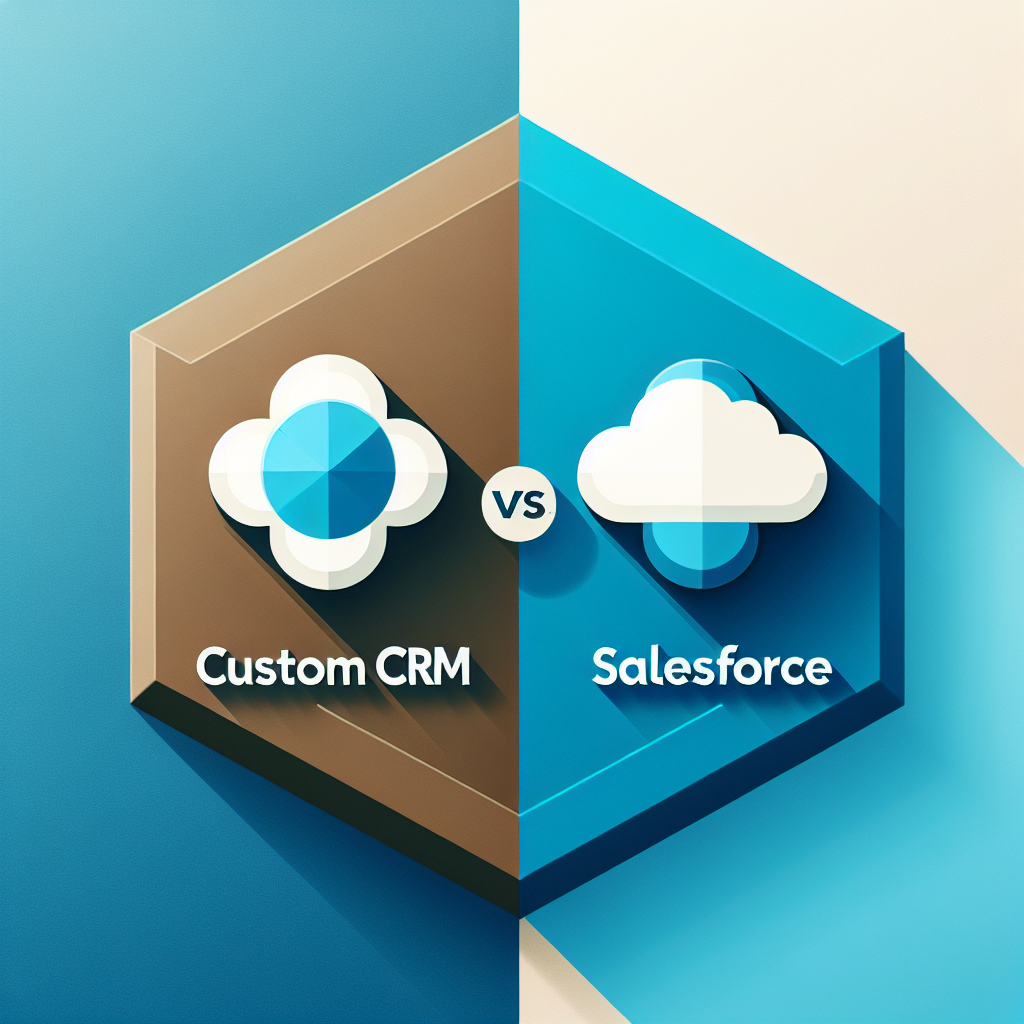Custom CRM vs. Salesforce: Which is Right for Your Business?
Choosing between a custom CRM and Salesforce can be a daunting task for any business. This article delves into the strengths and weaknesses of each option to help you make an informed decision.

Understanding CRM Solutions
Customer Relationship Management (CRM) software is essential for businesses looking to manage interactions with customers, streamline processes, and enhance profitability. While Salesforce is a well-known leader in the CRM space, many businesses are also considering custom CRM solutions tailored to their specific needs.
What is Salesforce?
Salesforce is a cloud-based CRM platform that provides a comprehensive suite of tools for sales, customer service, marketing, and more. Its strength lies in its extensive features, scalability, and robust community of developers and users. Salesforce offers:
- Out-of-the-Box Functionality: With various modules available, businesses can quickly start using Salesforce to manage their customer relationships.
- Integration: Salesforce easily integrates with numerous third-party applications, enhancing its capabilities.
- Analytics and Reporting: It provides advanced reporting tools that help businesses gain insights into customer behavior and sales performance.
- Customization: While Salesforce offers many features, it also allows for customization to fit specific business processes.
The Allure of Custom CRM Solutions
Custom CRM solutions are built specifically for a company’s unique needs. They can be developed from scratch or by modifying existing platforms. Here’s why some businesses opt for a custom solution:
- Tailored Features: A custom CRM can be designed to include only the features your business needs, eliminating clutter and ensuring that the system fits your workflow.
- Scalability: As your business grows, you can easily adjust your custom CRM to accommodate new requirements without being constrained by the limitations of a pre-packaged solution.
- Competitive Advantage: A unique CRM can offer features that competitors using generic solutions might lack, providing a distinct edge in the market.
Comparing Costs
When it comes to cost, Salesforce operates on a subscription model, which can be quite affordable for small businesses but may become expensive as you scale. On the other hand, a custom CRM requires an upfront investment in development but can save money in the long run if designed efficiently.
The total cost of ownership should factor in:
- Initial development and implementation costs for custom solutions.
- Ongoing subscription fees for Salesforce, which can vary depending on the features you choose.
- Maintenance and support costs for both options.
User Experience and Support
Salesforce is widely recognized for its user-friendly interface and extensive support resources, including a vast online community, tutorials, and customer service. However, if users find Salesforce too complex with unnecessary features, a custom CRM can offer a streamlined interface that’s easier to navigate.
Consider:
- How quickly your team can learn and adapt to the CRM.
- The availability of support resources and training materials.
Flexibility and Integration
Salesforce shines in terms of integration with other tools and platforms. However, a custom CRM can be built to integrate seamlessly with your existing systems, which may provide a more cohesive experience. This is particularly important for businesses with unique operational needs or specialized software.
Real-World Examples
Let’s consider two hypothetical businesses:
- Business A: A startup that needs a simple CRM to manage its client interactions. They opt for Salesforce due to its quick setup and ready-to-use features.
- Business B: A large company with complex processes and unique requirements. They choose a custom CRM to ensure it fits seamlessly into their workflow and scales with their growth.
Making the Right Choice
Deciding between a custom CRM and Salesforce ultimately comes down to your business's specific needs, budget, and long-term goals. If you’re looking for a quick solution with robust features, Salesforce may be the way to go. But if you need something tailored to your unique processes and ready to grow with you, a custom CRM could be your best bet.
Whatever route you choose, remember that your CRM should ultimately enhance your ability to engage with customers, streamline operations, and contribute to your overall business success. If you find yourself needing assistance in building a custom solution, consider reaching out to our team at PMIO.net for expert guidance.
Conclusion
Evaluating the pros and cons of custom CRM solutions versus Salesforce is crucial for any business aiming to optimize its customer relationships. By understanding your specific needs and weighing the options, you can make a well-informed decision that aligns with your goals and enhances your operational efficiency.
Related Articles
Unlocking Growth: How Database Migration Services Benefit Growing Businesses
As businesses grow, so do their data needs. Database migration services can help streamline data man...
Unlocking Efficiency: The Power of Custom Inventory Management Software Development
In today’s fast-paced business environment, effective inventory management is crucial. Custom invent...
Transforming Business: The Impact of Custom Software Solutions
In the digital age, custom software has become a game-changer for businesses. This article delves in...